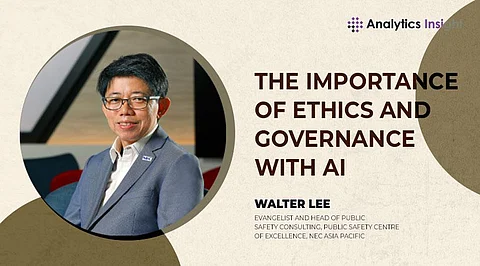

The harnessing of AI has and will bring tremendous benefits to society, such as making supply chains more efficient, advancing intelligent automation and robotics to support our everyday living, and offering seamless clearances at borders. AI technology has advanced so much to the point that it has fast approached, and in some instances exceeded, human intellect. Just as human intelligence needs to be harnessed and orchestrated appropriately in human societies with good ethics and governance, we need to do the same with AI.
There are some considerations to bear in mind. If you have heard about GPT-4chan, you would also have heard how problematic it was. Developed by a Youtuber in the Artificial Intelligence (AI) community, the GPT-4chan model was made based on the /pol/ board (politically incorrect board) of 4chan, a controversial forum. The result? An AI that spewed hate speech.
As troubling as that may seem, the very basis of AI may inadvertently encourage such practices that make it easy to use the technology for nefarious purposes. That is starkly evident as the community increasingly embraces open-source development. This no longer restricts the development of AI applications to a small number of privileged companies but opens it up for all to use — including bad actors.
Should we be surprised? The likes of Bill Gates, Elon Musk and Jeff Bezos have all expressed concerns and issued warnings about the potential dangers of AI, especially around their usage within weapons systems and job displacement. However, much of what we experience today involves AI to some extent, such as the ads that are targeted specifically to us on social media and our favourite streaming platforms recommending new content to us based on our previous choices and habits. If we truly want to transform AI's potential into a reality, then there are concerns that must first addressed.
AI systems have grown exponentially in recent years. It has spawned numerous benefits, but it is not insulated from certain drawbacks that have sparked concerns, especially around topics like compliance, ethics and governance.
Addressing these issues requires us to look beyond mere legal compliance. Instead, various factors such as privacy, human rights, and social acceptability must be considered. This type of problem solving should not be limited to firms involved in the development and marketing of AI. AI-related issues must be dealt with across the entire supply chain — including by individuals and organisations that provide AI-based services. These include:
Technologists are not the only stakeholders when it comes to addressing AI issues. Policymakers will also play an important part in helping us address the potential risks of AI application. They'll be responsible for:
Lastly, investments must also be made to ensure that the ecosystem remains viable and that there is a deep and robust talent pool to continually staff AI-related roles. Consulting firm Korn Ferry estimates that Asia Pacific's TMT sector could face a talent shortfall of 2 million – including AI professionals, at an annual opportunity cost of more than $151.60 billion by 2030. Singapore, for instance, has committed $180 million to accelerate AI research and launched programmes to upskill people with AI skills. While those might address the "hard" skills such as AI engineering and development, "soft" skills important too. Singapore's Nanyang Technological University and Singapore Computer Society have also launched a course in AI ethics and governance aiming to recognise and certify professionals in those areas.
Ultimately, there needs to be a deep and open discussion on what AI can and cannot do. Organisations and governments alike need to make sure that it will be used to benefit as many people as possible. Measures need to be adopted to ensure AI does not omit, by design or by accident, certain subsets of society, assuage privacy and trust concerns and implement safeguards that give humans a degree of control.
The increasing use of AI in daily life will undoubtedly continue to raise questions around ethics, compliance and governance. Are humanity's AI goals ambitious or just simply dangerous? That is a question that all involved stakeholders – governments, regulators, innovators, tech firms and consumers – need to collectively work towards answering.
Walter Lee, Evangelist and Head of Public Safety Consulting, Public Safety Centre of Excellence, NEC Asia Pacific
Join our WhatsApp Channel to get the latest news, exclusives and videos on WhatsApp
_____________
Disclaimer: Analytics Insight does not provide financial advice or guidance. Also note that the cryptocurrencies mentioned/listed on the website could potentially be scams, i.e. designed to induce you to invest financial resources that may be lost forever and not be recoverable once investments are made. You are responsible for conducting your own research (DYOR) before making any investments. Read more here.
